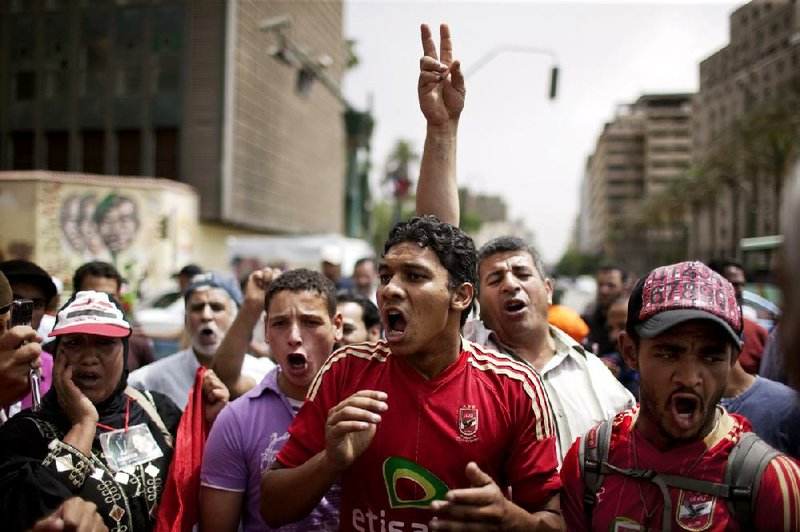CAIRO, Egypt — The runoff to become Egypt’s first freely elected president is likely to be a contest between two of the most powerful and polarizing forces in Egyptian society representing different visions for the future character of the nation: the Muslim Brotherhood and the military.
After a two-month campaign by more than a dozen candidates, Mohammed Morsi of the Muslim Brotherhood and Ahmed Shafiq, a former air force general who served as President Hosni Mubarak’s final prime minister, emerged with the most votes Friday, according to independent tallies and the official state news media.
Morsi won about a quarter of the vote and Shafiq slightly less, effectively reprising the decades-old power struggle between a military-backed, secular strongman and Islamists intent on a more disciplined, religious-infused system of governance.
For many, the choice dimmed the hope that last year’s popular revolution would ultimately chart a middle path, one that united rather than polarized, transcending differences instead of exacerbating them. But Morsi and Shafiq represent extremes, offering a wrenching choice for the majority of voters who had cast their ballots for one of the other candidates.
“The worst possible scenario,” said Ahmed Khairy, spokesman for the Free Egyptians Party, one of the secular, liberal parties that emerged last year. Speaking to the Al-Ahram daily, he described Morsi as an “Islamic fascist” and Shafiq as a “military fascist.”
Although Shafiq never explicitly promised to resurrect the old order, he campaigned as a strongman who would crack down on street protests, restore law and order and check the power of the Islamists, offering a worldview consistent with Mubarak.
Morsi, facing a serious challenge from an Islamist rival during the campaign, reverted to a conservative and expressly religious appeal, portraying his platform as a distillation of Islam itself while promising the implementation of Islamic law. The results put the Muslim Brotherhood, the secretive 84-year-old revival society that exported Islamist politics to the world, within reach of a monopoly on the presidency and Parliament.
Though official final results are to be released in a few days, early returns showed that about 20 percent voted for Abdel-Moneim Abolfotoh, a former Brotherhood leader campaigning as both an Islamist and a liberal in a bid to break out of Egypt’s culture war. And another roughly 20 percent voted for Hamdeen Sabahi, a secular populist with a record of fighting the Mubarak government on behalf of the poor. Fifth place went to Amr Moussa, a former foreign minister who presented a softer and more conciliatory version of Shafiq’s secular law-and order appeal.
Meanwhile, Morsi had 25.3 percent of the vote and Shafiq 24.9 percent, with less than 100,000 votes difference.
“It is a shock,” said Ahmed Kabany, 38, an engineer, noting that together Abolfotoh and Sabahi received more votes than either Morsi or Shafiq. The chaos of the extended transition since Mubarak’s ouster “made a lot of Egyptians hate the revolution so they turned to the same crooks,” Kabany said. “I don’t want either one, so I am not going to vote.”
The journalist and author Ashraf Khalil summed up the same dismay in an online commentary: “If it’s really Shafiq/Morsi, then I’m launching a ‘vote-for-Satan campaign,”’ he wrote. “Why settle for a lesser evil?”
The two candidates represent starkly different visions of Egypt’s future. The Brotherhood promises to build what it considers the first expressly Islamic democracy. Shafiq promises mainly stability and continuity with the past.
In matters of foreign policy, both have pledged to continue Egypt’s alliance with the United States and respect the peace treaty with Israel. But Morsi has been a sharp critic of Israel over its treatment of the Palestinians, even calling its citizens “vampires.” Where Shafiq would most likely continue to distance Egypt from Hamas, the militant Islamist Palestinian faction, Morsi would build the much closer ties to the group. Brotherhood has said it intends to stand as an umbrella over both Hamas and the rival Western-backed Fattah faction in the hope of bringing them together to put new pressure on Israel to recognize a Palestinian state.
The race for the June 16-17 runoff is further complicated by the uncertainty about the powers of the next president. A Parliament-picked committee that was supposed to draft a new charter has become deadlocked in a dispute between Islamists and liberals. The military council that has governed Egypt since Mubarak’s ouster says it will issue an interim constitution to define the president’s powers, but it has not yet done so.
Morsi, considered less charismatic than the other candidates, relied mainly on the Brotherhood’s political machine to turn out voters. He sat out the one televised debate and his face barely appeared in his television commercials.
Shafiq, a gruff former fighter pilot, earned the nickname “the pullover” for the sweaters he wore in television interviews and campaign posters, presumably to make him seem more approachable; no minister of the Mubarak government had previously appeared without a jacket and tie.
Like Morsi, he was also derided for his awkward speaking style. During his brief tenure as prime minister, he was forced to resign after a humiliating public debate on a television talk show with a liberal critic and author, Alaa el Aswany. “I fought in wars,” he said in exasperation at one point. “I killed and was killed.” Information for this article was contributed by David D. Kirkpatrick and Kareem Fahim of The New York Times and by Lee Keath and Sarah El Deeb of The Associated Press.
Front Section, Pages 8 on 05/26/2012
